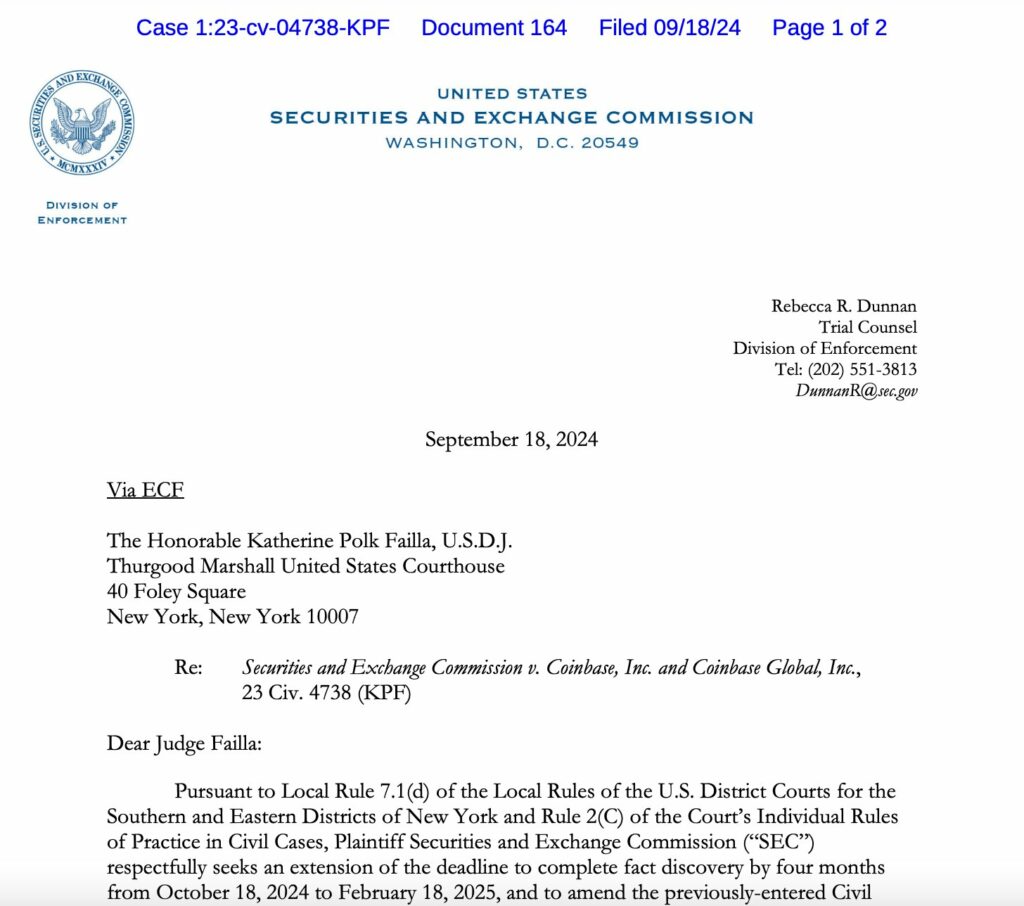Highlights:
- The SEC seeks an additional four months to review over 133,000 documents in the Coinbase lawsuit.
- The new deadline for discovery in the SEC vs. Coinbase case could extend until February 2025, beyond the elections.
- Coinbase has agreed to the extension, while political speculation has arisen due to the post-election timeline.
The U.S. Securities and Exchange Commission (SEC) has requested a four-month extension to complete discovery in its ongoing lawsuit against Coinbase. This would push the deadline to February 2025, placing the discovery process after the U.S. presidential election. The case, which involves allegations that Coinbase facilitated the trading of unregistered securities, has garnered significant attention due to its potential implications for cryptocurrency regulation.
The SEC made the request in a letter to Judge Katherine Failla, citing the need to review over 133,582 documents related to the case. Initially, the regulator had to produce these documents until October 18, 2024. However, the SEC now argues that the volume of information necessitates more time to comply with the court’s order. Coinbase has agreed to this extension, marking the first time either party has requested a delay in the case.

Extensive Document Review
The SEC’s case against Coinbase requires the production of a substantial number of documents, contributing to the requested delay. According to the SEC, the discovery process involves reviewing unique documents and files, all of which are crucial to the case. The regulator has stated that it needs additional months to ensure a thorough review and to comply with the court’s demands.
The extension will give both parties more time to prepare for the upcoming trial. Expert discovery, which includes depositions and additional documents, could be extended to April 2025. These delays may also push the trial itself into 2025.
Legal Implications and Political Speculation
This development has sparked speculation about the possible political motivations behind the SEC’s request. Critics have pointed out that the new deadline conveniently places the case after the 2024 U.S. presidential election. With the SEC already facing scrutiny over its handling of cryptocurrency cases, some have questioned whether the regulator is using this delay to buy time amid increasing political pressure.
Despite these concerns, the SEC has maintained that the extension is purely procedural and necessary to meet the discovery requirements. Additionally, the SEC’s recent loss in the Ripple case and its ongoing challenges with other crypto-related lawsuits. This includes cases against Binance and Kraken, have raised questions about the agency’s strategy in regulating the digital asset industry.
Coinbase’s Separate Legal Battle
While the SEC has focused on the discovery process, Coinbase has pursued its own legal actions. Coinbase Chief Legal Officer (CLO) Paul Grewal has been involved in a Freedom of Information Act (FOIA) lawsuit against the Federal Deposit Insurance Corporation (FDIC). The lawsuit aims to uncover documents related to “Operation Choke Point 2.0,” an alleged effort by U.S. regulators to limit crypto firms’ access to traditional banking services.
Grewal has stated that the court has asked the FDIC to provide a Vaughn Index, a detailed list of documents withheld under FOIA. This development could shed light on how U.S. regulators have treated cryptocurrency firms in the banking sector.
This is great. Applying more pressure.
Will get harder for the administration to maintain the position that there is no such thing as #OperationChokepoint2.0.
So weird that Congress doesn't do this work.
Why does a public company have to perform Congress's oversight function?— MetaLawMan (@MetaLawMan) September 19, 2024
Pro-crypto lawyer James Murphy, also known as “MetaLawMan,” has weighed in on the broader regulatory landscape. He agrees with Grewal that more pressure needs to be applied to force regulators to reveal the truth about their actions against crypto firms.
Ripple Effect in the Crypto World
The SEC’s lawsuit against Coinbase is part of a broader regulatory crackdown on cryptocurrency exchanges. Earlier this year, the SEC won a partial victory in its case against Ripple Labs, though the ruling did not result in the outcome the regulator had hoped for. After a lengthy court battle, Ripple was ordered to pay $125 million.
The ongoing legal battles involving major crypto exchanges like Coinbase and Binance highlight the regulatory uncertainty surrounding digital assets. It remains unclear whether a change in SEC leadership after the 2024 election would significantly alter the agency’s approach to cryptocurrency regulation.





